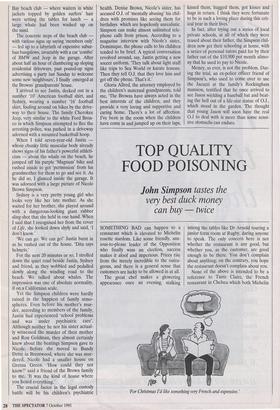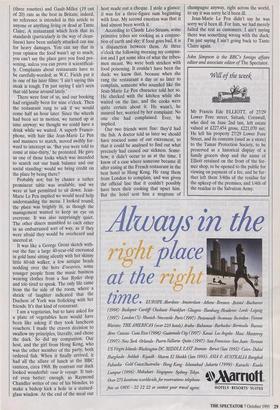TOP QUALITY FOOD POISONING
John Simpson tastes the
very best duck money can buy — twice
SOMETHING BAD can happen to a restaurant which is elevated to Michelin rosette stardom. Like some friendly, anx- ious-to-please leader of the Opposition who finally wins an election, success makes it aloof and imperious. Prices rise from the merely incredible to the outra- geous, and there is a general sense that customers are lucky to be allowed in at all.
The great chef makes a glowering appearance once an evening, stalking among the tables like Dr Arnold touring a junior form room at Rugby, daring anyone to speak. The only concern here is not whether the restaurant is any good, but whether you, as the customer, are good enough to be there. You don't complain about anything; on the contrary, you hope the restaurant doesn't complain about you.
None of the above is intended to be a reference to Tante Claire, the French restaurant in Chelsea which both Michelin 'For Christmas I'd like something very French and expensive.' (three rosettes) and Gault-Millot (19 out of 20) rate as the best in Britain; indeed, no reference is intended in this article to anyone or anything living or dead at Tante Claire. A restauranxt which feels that its standards (particularly in the way of clean- liness) have been unfairly attacked can sue for heavy damages. You can say that in your opinion the food wasn't up to much; you can't say the place gave you food poi- soning, unless you can prove it scientifical- ly. Complaints about restaurants have to be carefully-worded; as W.C. Fields put it in one of his later films: 'I ain't saying this steak is tough, I'm just saying I ain't seen that old horse around lately.'
There were four of us, and our booking had originally been for nine o'clock. Then the restaurant rang to ask if we would come half an hour later. Since the wheels had been set in motion, we turned up at nine anyway; we thought we could have a drink while we waited. A superb Franco- phone, with hair like Jean-Marie Le Pen and manners to match, moved swiftly for- ward to intercept us. 'But you were told to come at nine-thirty,' he protested. He gave us one of those looks which was intended to search out our bank balance and our social standing: would we bring credit on the place by being there?
Probably not; but by chance a rather prominent table was available, and we were at last permitted to sit down. Jean- Marie Le Pen implied we would need help understanding the menu. I looked round; the place was brightly lit, as though the management wanted to keep an eye on everyone. It was also surprisingly quiet.
The other diners mumbled to each other in an embarrassed sort of way, as if they were afraid they would be overheard and sneered at.
It was like a George Grosz sketch with- out the fun: a large 40-year-old encrusted in gold lame sitting silently with her skinny little 60-ish walker, a few antique heads nodding over the hors d'oeuvres, some younger people from the music business wearing clothes from a Sue Ryder shop and too tired to speak. The only life came from the far side of the room, where a shriek of laughter indicated that the Duchess of York was frolicking with her friends. It's that kind of restaurant.
I am a vegetarian, but to have asked for a plate of vegetables here would have been like asking if they took luncheon vouchers. I made the craven decision to swallow my principles, literally, and chose the duck. So did my companion. Our host, and the girl from Hong Kong, who was the other member of the party, both ordered fish. When it finally arrived, it had all the allure of lunch at the BBC canteen, circa 1968. By contrast our duck looked wonderful: vaut le voyage. It tast- ed even better; enough, as Raymond Chandler writes of one of his blondes, to make a bishop kick a hole in a stained- glass window. At the end of the meal our host made out a cheque. I stole a glance: it was for a three-figure sum beginning with four. My second emotion was that it had almost been worth it.
According to Claude Levi-Strauss, some primitive tribes see cooking as a conjunc- tion of earth and sky; if food goes bad, it is a disjunction between them. At three o'clock the following morning my compan- ion and I got some idea of what the tribes- men meant. We were both stricken with food poisoning. It couldn't have been the duck: we know that, because when she rang the restaurant a day or so later to complain, someone who sounded like the Jean-Marie Le Pen character told her so. He checked with the kitchen while she waited on the line, and the cooks were quite certain about it. He wasn't, he assured her, worried by her complaint. No one else had complained. Ever, he implied. Our two friends were fine: they'd had the fish. A doctor told us later we should have rescued some of our excrement, so that it could be analysed to find out what precisely had caused our sickness. Some- how, it didn't occur to us at the time. I know of a case where someone became ill after eating at the French restaurant in the best hotel in Hong Kong. He rang them from London to complain, and was given the official line that it couldn't possibly have been their cooking that upset him. But the hotel sent him a magnum of champagne anyway, right across the world, to say it was sorry he'd been ill.
Jean-Marie Le Pen didn't say he was sorry we'd been ill. For him, we had merely failed the test as customers. I ain't saying there was something wrong with the duck; I'm just saying I ain't going back to Tante Claire again.
John Simpson is the BBC's foreign affairs editor and associate editor of The Spectator.











































































 Previous page
Previous page